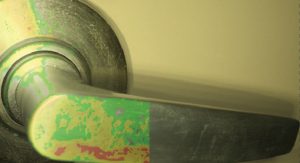OptiSolve, a division of Charlotte Products Ltd., and the Kelley Lab at the University of Toronto have been awarded a $4.5 million grant from Genome Canada to focus on the detection and identification of surface microbial contamination in high-risk facilities.
The partners will combine novel nanomaterials with a genomics-based approach to allow for precise identification of pathogens that cause hospital-acquired infections (HAIs).
OptiSolve has developed an environmental monitoring system and optical sensor technology, called Pathfinder, which is used to image and assess surfaces for microbial contamination.

Left side of photo shows actual OptiSolve Pathfinder environmental monitoring system and optical sensor technology imaging and assessing surfaces for microbial contamination, right side of photo is how the “clean” door handle looks to the eye.
According to a press release, the second phase development of this technology will let hospitals, long-term care facilities, and retirement homes rapidly detect and identify harmful agents, such as MRSA, C. difficile, and influenza, with the resultant benefits of proactive prevention and quick interventions.
“The current OptiSolve offering already provides breakthrough precision cleaning capabilities to improve environmental health and safety in all types of facilities – from hospitals to food manufacturing plants to educational facilities and offices – just to name a few. However, this grant takes us to the next level because we will be able to identify deadly pathogens such as C. diff and listeria on surfaces, in real time. We couldn’t be more pleased,” said Tony Ambler, chairman of Charlotte Products Ltd., in a press release.
Photo courtesy of OptiSolve, a division of Charlotte Products Ltd.










